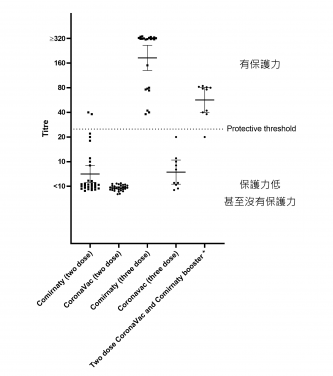Media
HKUMed-CU Medicine joint study finds that third dose of Comirnaty
has better protection from COVID-19 variant Omicron
23 Dec 2021
A recent study jointly conducted by the LKS Faculty of Medicine, The University of Hong Kong (HKUMed) and the Faculty of Medicine, The Chinese University of Hong Kong (CU Medicine) shows that a third dose of Comirnaty vaccine given to those who received two doses of either Comirnaty or CoronaVac provides protective levels of protective antibody against the Omicron variant of SARS-CoV-2; while a third dose of CoronaVac given to those who received two previous doses of CoronaVac does not provide adequate levels of protective antibody. The findings are now published in Nature Medicine. [link to the publication]
Background
The Omicron variant of SARS-CoV-2 is highly transmissible and poses major threats to public health globally. Vaccination remains a crucial intervention to protect from severe disease and death. Omicron variant is reported to be able to partially escape from the protective effects of “virus-killing” (neutralising) antibody.
A research led by Professor Malik Peiris, Tam Wah-Ching Professor in Medical Science and Chair Professor of Virology at the School of Public Health, HKUMed and Professor David Hui Shu-cheong, Stanley Ho Professor of Respiratory Medicine and Chairman of Department Medicine and Therapeutics, CU Medicine, has studied the virus neutralising activity in the blood of people vaccinated with the Comirnaty or CoronaVac vaccines currently in use in Hong Kong.
Research findings
The findings show that two doses of either Comirnaty or CoronaVac vaccines provide very poor virus killing (neutralising) antibody responses against Omicron. The findings also show that a third dose of Comirnaty vaccine given to those who received two doses of either Comirnaty or CoronaVac provides protective levels of protective antibody against the Omicron variant; while a third dose of CoronaVac given to those who received two previous doses of CoronaVac does not provide adequate levels of protective antibody.
Professor David Hui urged those eligible but who have not received two doses of vaccine to get vaccinated as a matter of urgency, ‘The transmissibility of Omicron variant means that if the virus started spreading in Hong Kong, unvaccinated people who are highest risk of severe disease - older age or underlying diseases such as diabetes and hypertension, will rapidly at high risk.’ He pointed out that the reduced severity of Omicron epidemics in South Africa and United Kingdom was being reported from vaccinated or previously infected (in South Africa) populations. Hospitals in Intensive Care Units (ICUs) in affected countries are rapidly getting filled with unvaccinated people.
‘Those who had received two doses of either Comirnaty or CoronaVac should get a third dose of Comirnaty vaccine around six months after their second dose of vaccine to achieve optimal protection against Omicron variant,’ remarked Professor Malik Peiris.
About the research team
The study team included Dr Chris Mok Ka-pun, Dr Susanna S Ng, Ms Karen Yiu, Dr Fanny W Ko, Dr Ken KP Chan, Dr Grace Lui, and Miss Chunke Chen at CU Medicine; and Professor Leo Poon Lit-man, Mr Samuel Cheng Mo-sheng, Mr Karl Chan Chak-kai, Mr Leo Luk Long-hei, Mr John Li Ka-chi, Ms Yonna Leung Wing-yan, Mr Leo Tsang Chi-hang from the School of Public Health, HKUMed.
Acknowledgements
The research was funded by the Health and Medical Research Fund, Government of the Hong Kong Special Administrative Region.
Media enquiries
Please contact LKS Faculty of Medicine of The University of Hong Kong by email (medmedia@hku.hk).

